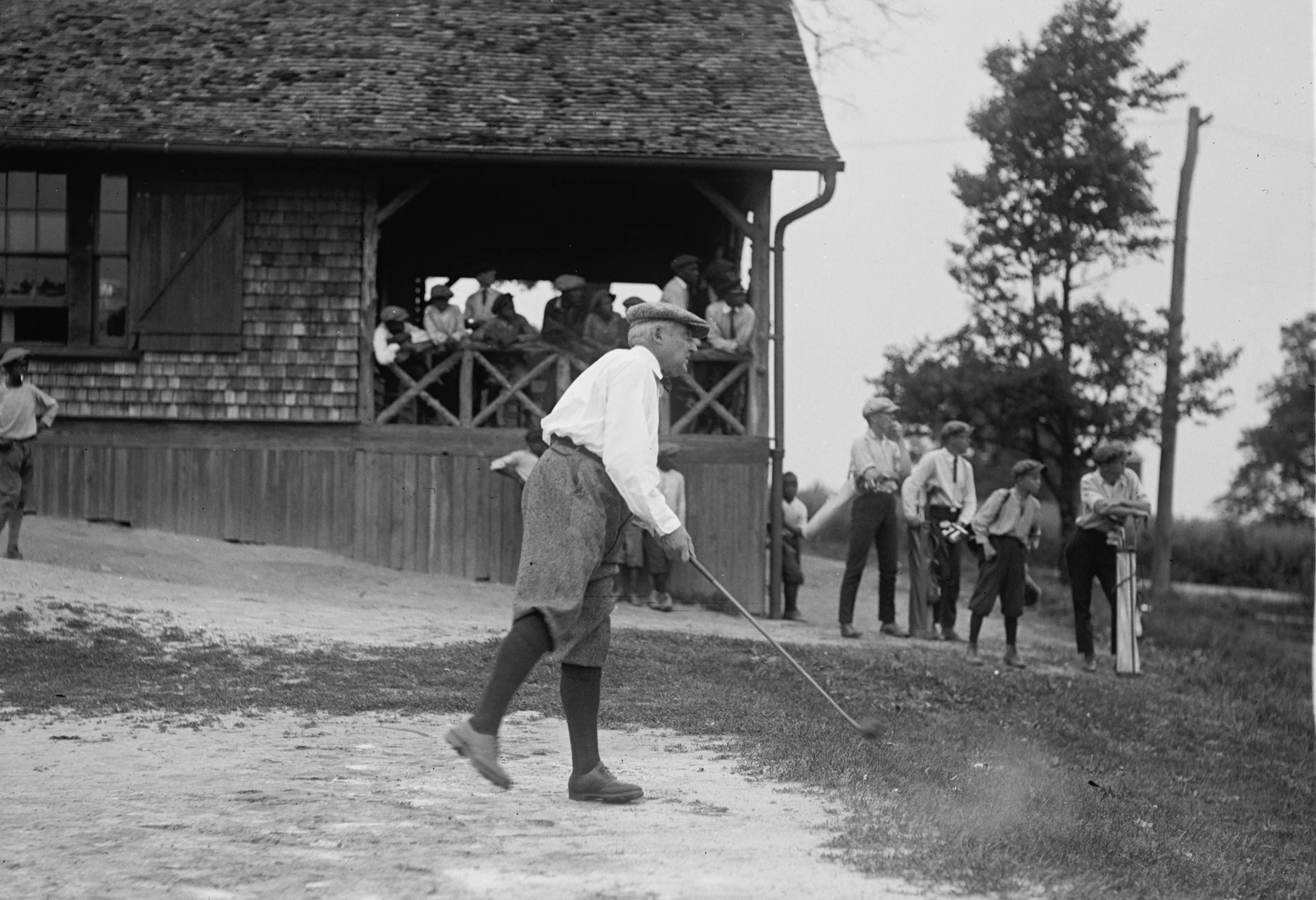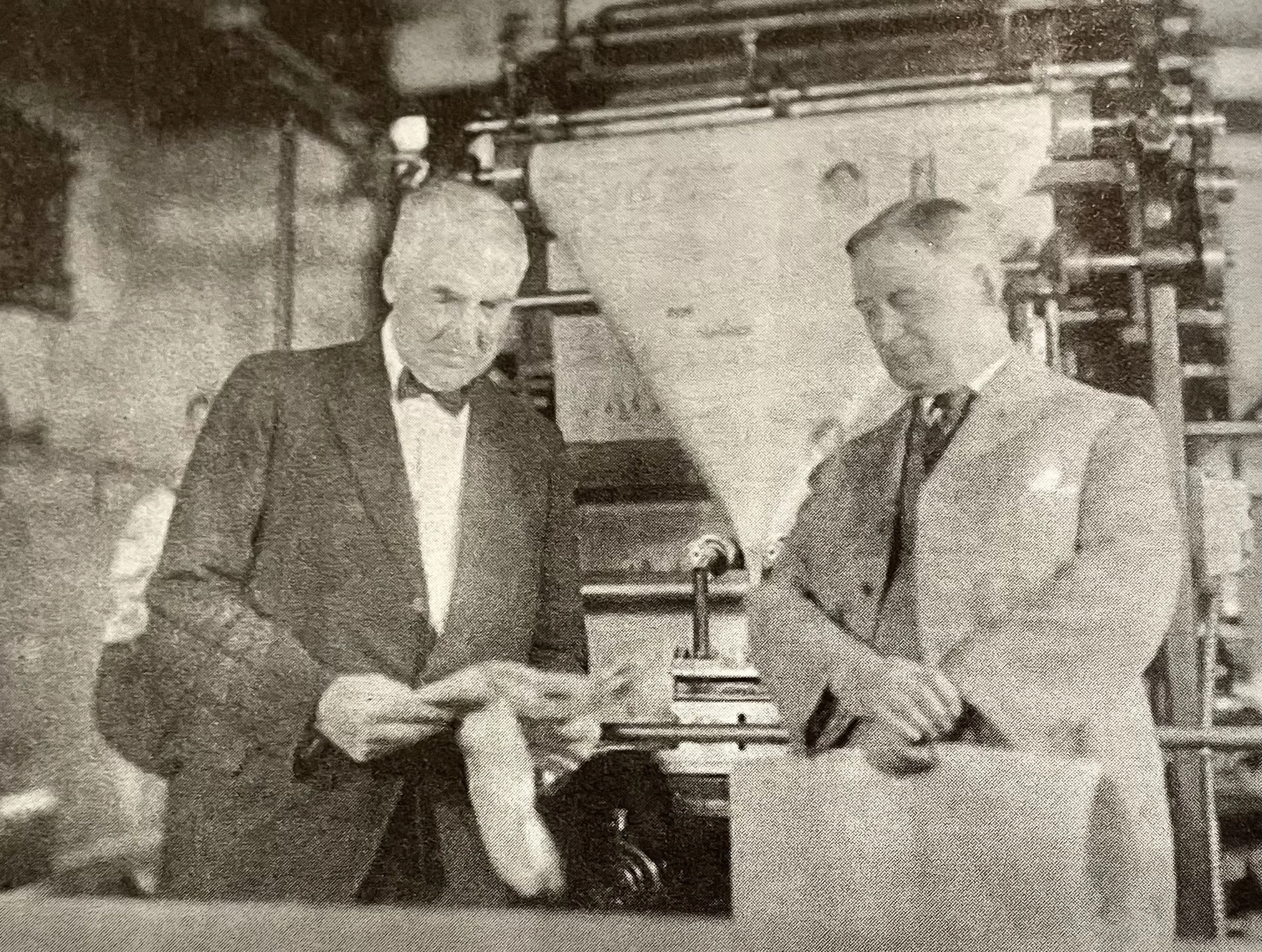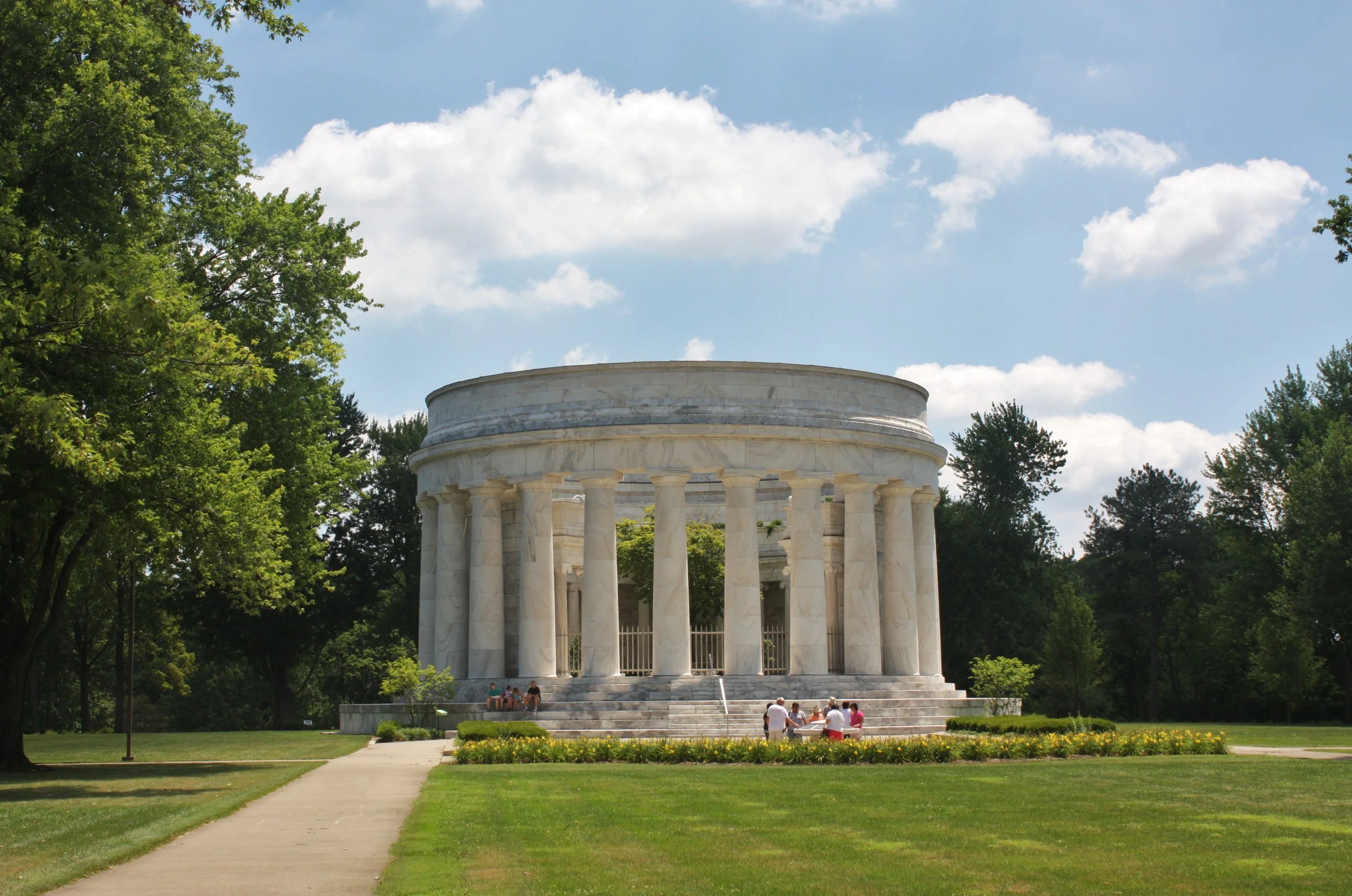Warren G. Harding 1865-1923
The 29th President
A Champion of Technology, Minorities and Women, Yet Plagued By Scandal.
Warren G. Harding, an Ohio Republican, was the 29th President of the United States. Though his term in office was fraught with scandal, including Teapot Dome, Harding embraced technology and was sensitive to the plights of minorities and women. Bill Grant will be portraying the controversial president at the Victorian Chautauqua.
Warren Gamaliel Harding was born in tiny Blooming Grove, Ohio, and rose to be the country's 29th President. Serving a mere twenty-nine months in office, March 1921- August 1923, Harding sought to return the country to "normalcy" following the progressive movements of the preceding two decades, and the devastation of World War I. His genial personality and naive, absolute trust in others sowed the seeds for scandals that would erupt following his death. Only survived by a tarnished reputation, Harding was relegated to the ranks of the most unsuccessful presidents.
Though born in Blooming Grove, Harding spent most of his life in nearby Marion, Ohio. While it took some time for Harding to find himself and his career, he succeeded in building the moribund "Marion Star" into a successful newspaper and conservative mouthpiece. It also served as his springboard into Ohio politics, where he eventually served in the state Senate and as Lieutenant Governor. Although he was defeated in a run for the Governorship in 1910, he was elected to the U.S. Senate four years later.
Part of Harding's appeal was both his dashing appearance and his oratorical skills. As to the former, this played a role in the 1920 nomination and, unfortunately, played a more notorious role in his multiple affairs. His skills as a speaker were enough to prompt President Taft to ask Harding to make his nomination speech in the hotly contested 1912 Republican Convention even though Harding did not, at that time, hold office.
In 1916, the incumbent U.S. Senator, Theodore Burton, announced he would not run. Rather than turn to older, and by some measure, more stale candidates, the Ohio political machine looked to Harding. His conciliatory style, served him well in both securing the nomination and election, and as it would again in 1920. Interestingly, this senate election was the first after the approval of the 17th Amendment providing for the direct election of Senators.
As a senator, Harding was a stalwart party man. Coupled with his amicable personality, he demonstrated remarkable skill in assuming nuanced positions on controversial issues, most notably suffrage and prohibition. This allowed him to straddle the fence between the party's conservatives and progressives. Such widespread success led him to be named as chair of the 1916 Republican Convention where he delivered the keynote address.
As 1920 dawned, it appeared that the battle for the nomination would pit war hero General Leonard Wood against Illinois Governor Frank Lowden and California Senator Hiram Johnson. Harding tossed his hat in the ring more as a way of continuing his hold on Ohio politics rather than a desire for the presidency. Both he and his wife, Florence, were very happy with his life as a senator. Harding's campaign manager Harry Daugherty was a master political manipulator who could foresee that Harding's chances were considerable. The strategy was quite simple and played to Harding's strengths – Make him the viable candidate who was unobjectionable to all. Through the first several ballots, no candidate emerged with a clear majority. On the legendary night of June 11, powerbrokers met for hours to sort things out. While no clear strategy emerged by the next morning, rumors surfaced that the party’s nomination was going to be Harding – And, this became a self-fulfilling prophecy.
With the nomination in hand, Harding and the Republicans rolled to victory on a theme "Return to Normalcy." Harding traveled little and hosted most of his campaign from his front porch in Marion. His ability to capture the presidency from the comfort of his front porch underscored his popularity among voters.
Harding (center) with Chief Justice Taft (left) and Robert Lincoln at the dedication of the Lincoln Memorial, May 30, 1922
The dichotomy of Harding's appointments is one of the most dramatic in American history. Some of his outstanding choices included Charles Evans Hughes to Secretary of State, Andrew Mellon to Secretary of the Treasury, and Herbert Hoover to the Secretary of Commerce. Others, such as Albert B. Fall to Secretary of the Interior and Harry M. Daugherty as Attorney General performed poorly and their graft led to combustible scandals that essentially destroyed Harding's reputation.
Harding's compassion for people was evident in his dealings in foreign affairs. Negotiations led to reductions in reparation payments from Germany and a long payback agreement for debts due from Great Britain. Aid was also sent to Russia, which was suffering through a devastating famine. He also reached southward to Latin America and Mexico seeking to improve relations. He even arranged for payments to Colombia for America’s questionable role in the Panama Revolution.
Domestically, Harding moved quickly to strengthen the nation’s weak post-war economy. Legislation providing some tax cuts and tariff protection, coupled with reductions in regulations, led to the economy recovering in 1922. Unemployment dropped from twelve percent to just over three percent and the Gross Domestic Product grew. His term's legislation also provided for the creation of the Bureau of the Budget, a first in American history. Harding showed a good grasp and interest in emerging technologies as well. Understanding the evolution of automobiles, he signed legislation authorizing significant investment in the nation's infrastructure. He attempted similar legislation for the fledgling airline industry, but this did not pass until after his death. He also appreciated the emergence of radio and led an effort to appropriately regulate this growing industry.
While Harding generally viewed the world with an interest in business, he was sympathetic to the plights of workers, brokering a settlement of a United Mine Workers Strike, and advocating broadly for a more humane eight-hour workday.
Harding displayed a surprisingly progressive view on race relations, probably due once more to his generally kind nature. Early in his administration, he called for anti-lynching legislation and sought to have Blacks included in his government. While his efforts are rightly viewed as tepid by today's standards, they were radically modern in the world of a century ago. In Birmingham, Alabama, the heart of the South, he gave a reformist speech calling for equality between the races.
The 1921 Greenwood Massacre was one of the most significant events in Tulsa’s history and a profound racial injustice during Harding's presidency. The affluent African American community known as the Greenwood District was nationally referred to as “Black Wall Street.” Following the tragic events initiated by white rioters, leaving 35 blocks of charred remains, Harding addressed an audience at the all-Black Lincoln University, exhorting the sympathetic idea of "oneness as Americans."
Flames across the Greenwood section of Tulsa, Oklahoma
Harding managed to find time to indulge some personal interests during his presidency. Playing poker a few times a week with his friends, and occasional golf outings provided him some relaxation time. He also sought relaxation by camping with his friends, Thomas Edison, Harvey Firestone, and John Burroughs, in a group they called "The Vagabonds."
Harding left a conservative imprint on the Judiciary, with four appointments to the Supreme Court and fifty appointments to the lower courts. His most notable appointment was naming former president, William Howard Taft as Chief Justice of the Supreme Court.
In an effort to better understand the needs and aspirations of the electorate, as well as bolster his presidency, Harding undertook a vigorous western trip which included dozens of stops starting in Kansas and continuing all the way to Alaska before traveling the west coast.
Harding had never taken good care of himself. Despite known heart issues, Harding did little by way of diet or exercise to quell doctors' concerns. He also smoked heavily and drank most days. As he relentlessly pushed himself on this westward trip his health began to falter. Beyond his physical frailty, Harding would have been considered emotionally fragile as well, suffering from a number of nervous breakdowns throughout his life. Prior to his presidency, he had spent time in sanitariums. Part of his tour was canceled and Harding sought to recuperate in San Francisco. While he seemed to be on the mend, he suddenly died on August 2, 1923, while his wife was reading to him by his side.
An Honorable Tribute
The nation reeled with grief unlike anything seen since Abraham Lincoln. Like Lincoln, there was a train procession across the country before bringing him home to Marion, Ohio where Harding and later his wife Florence was entombed in one of the largest memorials in America.
It was not long after his passing that the corrupt activities of some of Harding's top officers came to light. Most notable was Teapot Dome where Harding's Secretary of the Interior, Albert Fall, received kickbacks on the leasing of this oil-producing property. As a result, Fall became the first cabinet member in history to go to jail.
Attorney General Harry Daugherty was implicated in influence-peddling and taking payoffs associated with illegal liquor. Charles Forbes, Director of Veterans, was involved in kickbacks on both the scale of hospital surplus and on the construction of new Veteran's hospitals. Harding was made aware of this corruption just before his trip out west. Out of disappointment, he apparently physically assaulted Forbes and demanded that he resign his post. A despondent Forbes pleaded to be allowed to follow through with a planned trip to Europe. Harding's geniality conceded to Forbes who proceeded with his trip. Unfortunately for Forbes, leniency did not follow. He subsequently resigned and was later imprisoned for his transgressions.
Nothing had directly linked Harding to the scandals that surfaced after his death. Given the number of crimes, however, it serves as its own indictment for his lack of oversight and poor selections while in office. Public disappointment festered and a shared decline in his stature as a president has persisted to this day.
President Grover Cleveland honeymooned at the neighboring town of Deer Park, Maryland during his first term.
Bill Grant portrayed the 22nd and 24th President of the United States, Grover Cleveland, in a captivating performance at the 2021 Victorian Chautauqua. His detailed depiction roused an audience overflowing the Martin Tent. He’s a passionate history buff who takes a particular interest in presidents. Grant is eager to depict President Harding and all his respected and criticized ventures while in office.
Warren G. Harding will be the third president portrayed by Bill Grant. In 2019, he presented as William Howard Taft, who had visited Mountain Lake Park in 1911. From that experience, it became apparent that it might be preferable to create a fictitious visit than to be constrained by the actual date of the visit. Portraying Taft in 1911 left unaddressed the contentious 1912 election and his later service as a Chief Justice.
Bill’s portrayal of Harding will be fictitious. While Harding was friends with the camping Vagabonds, he never actually made it to Swallow Falls with them. This portrayal will show Harding visiting Mountain Lake Park at the beginning of his ill-fated trip out west in 1923, under the guise of seeing what he had been missing by not camping locally with the Vagabonds.








